 Petzlover
PetzloverRussian Harlequin Hound is originated from Russia but Treeing Tennessee Brindle is originated from United States. Russian Harlequin Hound may grow 7 cm / 3 inches higher than Treeing Tennessee Brindle. Russian Harlequin Hound may weigh 8 kg / 18 pounds more than Treeing Tennessee Brindle. Both Russian Harlequin Hound and Treeing Tennessee Brindle has same life span. Both Russian Harlequin Hound and Treeing Tennessee Brindle has almost same litter size. Both Russian Harlequin Hound and Treeing Tennessee Brindle requires Low Maintenance.
The origins of the Russian Harlequin Hound are somewhat vague as there are many Russian hunting hounds and many of them have a similar ancestry.
The Russian Harlequin Hound is an indigenous hound whose origins go back to the 18th century. The first breed standard was published in 1925.
The breed was then developed during the early 1900s – being a mix of Russian Hound and English Foxhound. The Russian Harlequin Hound is a rare dog breed and you will find it almost exclusively in Russia.
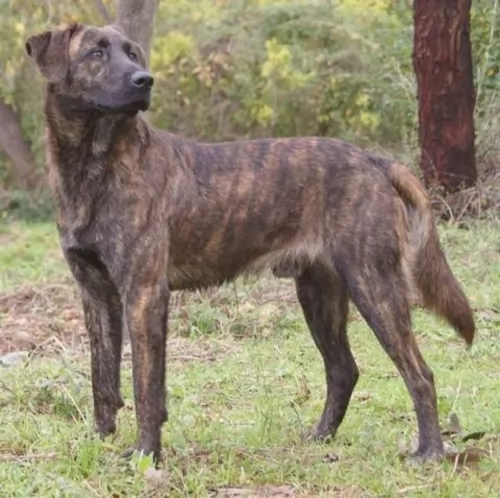 There doesn’t seem to be 100% clarity on how the dog came about but it originated in USA. It appears as though it was only since 1995 that records have been maintained through the American Kennel Club's Foundation Stock Service Program.
There doesn’t seem to be 100% clarity on how the dog came about but it originated in USA. It appears as though it was only since 1995 that records have been maintained through the American Kennel Club's Foundation Stock Service Program.
A Reverend Earl Phillips, who was a writer for a hunting magazine became aware of a Brindle Cur with a brown coat and tiger stripes. In fact ‘treeing’ is a type of hunting, where the dog chases an animal into a tree to escape. He heard about the dog’s amazing hunting skills.
In the early 1960s, he later formed The Treeing Tennessee Brindle Breeders Association, designed to protect the breed. It was in 2013 that the dog got foundation stock status with the American Kennel Club, but isn’t registered with the American Kennel Club.
The Russian Harlequin Hound is a medium to large sized dog that stands between 55 – 68cm in height and weighs between 18 – 31kg.
He has a solid build with long, straight legs with a long tail that can be slightly curved. The head is broad and square with medium sized ears which are floppy. The short coat is essentially white with tri-colored markings of white, tan and black.
The Russian Harlequin Hound has an amicable expression to his face and is a friendly social dog breed. He is lively and energetic, and with his hunting background will required a good deal of exercise.
They make great family pets, getting on well with children in the home and making friends with any other pets in the family. He is a gentle dog and with training and socialization is well mannered and obedient.
He loves his human family and wants to spend time with them in their company. He isn't suited to life in the city and a small property, but will require a home with bigger grounds.
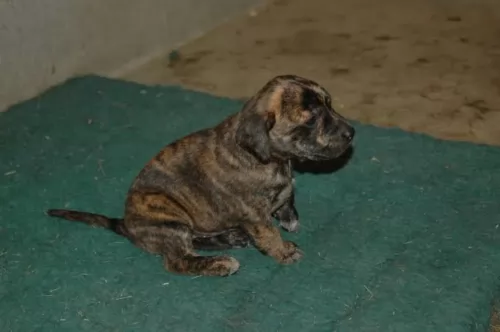 The Treeing Tennessee Brindle is a medium sized, deep chested breed of Cur, descending from the Old Brindle Cur dog.
The Treeing Tennessee Brindle is a medium sized, deep chested breed of Cur, descending from the Old Brindle Cur dog.
These strong dogs have a short, smooth brindle coat that is fairly soft to the touch. The coat's color is a mix of tan, black and a little bit of white.
He stands at between 41 and 61cm in height and weighs between 14 and 23kg both male and female. The Treeing Tennessee Brindle has a loud bark and it is best that this dog lives on a farm or in the suburbs as opposed to living in a small space in the city.
The Treeing Tennessee Brindle is a friendly, social dog and this is why he doesn’t make a particularly good watchdog.
He gets on well with children in the home as well as other dogs, not showing any aggression towards them.
They’re intelligent dogs and it will be a good idea to have them trained and socialized to make them well balanced and well behaved.
The Russian Harlequin Hound has always been a hunting dog, known for his excellent hunting skills. He isn’t only a good hunting dog, but he makes a good family pet too.
If you’re looking for an unusual dog breed that is also intelligent, loyal and loving, then you might want to consider this Russian Harlequin Hound.
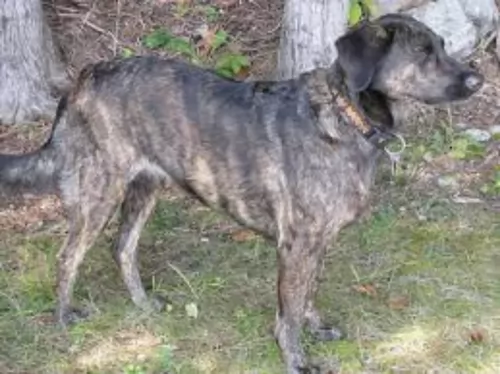 This brindle-colored cur dog is brave, intelligent and lively and his temperament allows him to be a good companion for his human family.
This brindle-colored cur dog is brave, intelligent and lively and his temperament allows him to be a good companion for his human family.
Even though they are friendly around strangers, they still make good watchdogs and will alert you to all kinds of visitors to your property. They do best in a home with large grounds and an active family where they can explore and sniff around. At the end of the day, they love to lie contentedly at your feet, a loyal, loving companion.
Your Russian Harlequin Hound is a rare dog breed that can reach 12 years of age if well cared for. There are some dog ailments that must be watched for. Cancer, ear infections and skin allergies can be problems to look out for. Other troublesome ailments can be -
This is a more common disease with deep-chested dogs, and the deep chested Russian Harlequin Hound is prone to bloat. Gas is trapped in the stomach and the stomach can actually twist. It can be life threatening. Your pet will have a hard, swollen belly and will be restless and salivating. Get him to the vet immediately. He may well require immediate surgery.
This condition is all about problems with the hip joints. It is sad for any dog with this disease as it can be painful for your pet to walk. Inflammation and arthritis can mean your pet being in pain. He can become lame too.
There are anti-inflammatory medications and your vet will suggest other treatments to make sure your pet is as comfortable as can be.
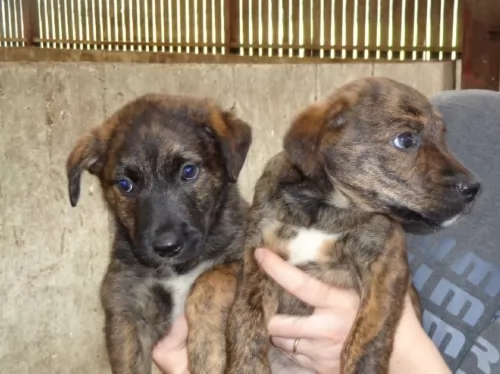 The Treeing Tennessee Brindle is a robust, healthy breed. You’re not likely to battle with too many health issues with him.
The Treeing Tennessee Brindle is a robust, healthy breed. You’re not likely to battle with too many health issues with him.
Watch out for ear infections which are more common in floppy eared dogs. Other common dog diseases that you need to know about -
This is a viral disease which is highly contagious and with no known cure. It’s why there is a vaccine against it. Coughing, lethargy, high temperature and loss of appetite with vomiting are symptoms of this disease.
This is another highly contagious respiratory viral infection transmitted between dogs in close proximity to each other, like in kennels for instance.
Symptoms include coughing, sneezing, nasal discharge, breathing difficulties, lethargy and loss of appetite. It’s important to get veterinary assistance as pneumonia could set in.
The Russian Harlequin Hound needs both mental and physical stimulation. He is a curious dog and wants to be out and about sniffing around and exploring. He will need to have a walk every day as well as lots of ball- and rope games. He will suit being the pet of a busy, outdoorsy family as opposed to a family of couch potatoes.
The Russian Harlequin Hound is looked upon as a low maintenance dog breed, and with his short, dense coat you can get by with just brushing him twice a week. Because he is such a lover of the outdoors check him over for ticks and fleas when you brush him.
Check inside his ears for redness and infection.
Open his mouth and look for bad, rotting teeth.
Check him over for any unusual lumps.
Make sure his eyes are clear and free of discharge.
Trim his nails.
Every dog should be fed excellent food as this encourages good health. Commercially manufactured dog foods can be wonderfully convenient and nutritious if you get the better quality ones.
Try and include some simple, tasty home-made food to his diet . High-quality dry dog food will provide a balanced diet, but you want to make it a little more tasty for him by giving him some chopped up boiled chicken, brown rice, sweet potatoes, carrots and spinach. This can be added into the dry kibble twice a week.
Try and include some raw meat occasionally. Fresh, cool water should always be available around the clock.
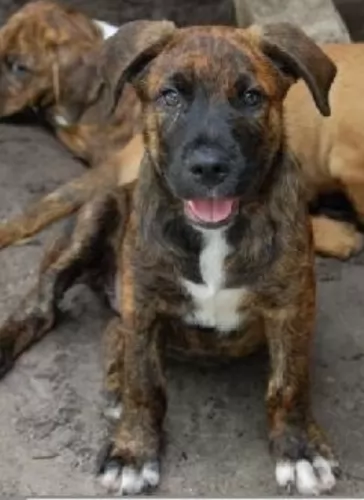 A brush once or twice a week will be sufficient for this dog. Look inside his ears for signs of redness which could indicate an ear infection. Make sure his eyes are still bright and not red and with a pus discharge. Trim his nails too.
A brush once or twice a week will be sufficient for this dog. Look inside his ears for signs of redness which could indicate an ear infection. Make sure his eyes are still bright and not red and with a pus discharge. Trim his nails too.
The Treeing Tennessee Brindle is a high energy dog and he is going o want more than just a walk every day, although he will love that and rely on you for this daily outing.
He will also want ball games and hide and seek games.The breed needs an active owner who will take him on long walks and hikes.
Whenever you opt to give a dog commercially manufactured dog food, you need to check that the dog food is made with high-quality ingredients which are mostly made up of protein or meat.
Certainly a puppy will need protein in his food for proper growth and he will require 4 bowls of food a day. An adult dog will require 2 bowls of food a day.
The type of commercial dog food you buy will depend on the age of your dog as well as his activity levels. If your dog has a known allergy or illness, there are dog foods manufactured with that in mind.
Try and in include some homemade food into his diet. Nothing spicey and exotic as this can cause stomach problems. A good guide is boiled chicken, brown rice and vegetables.